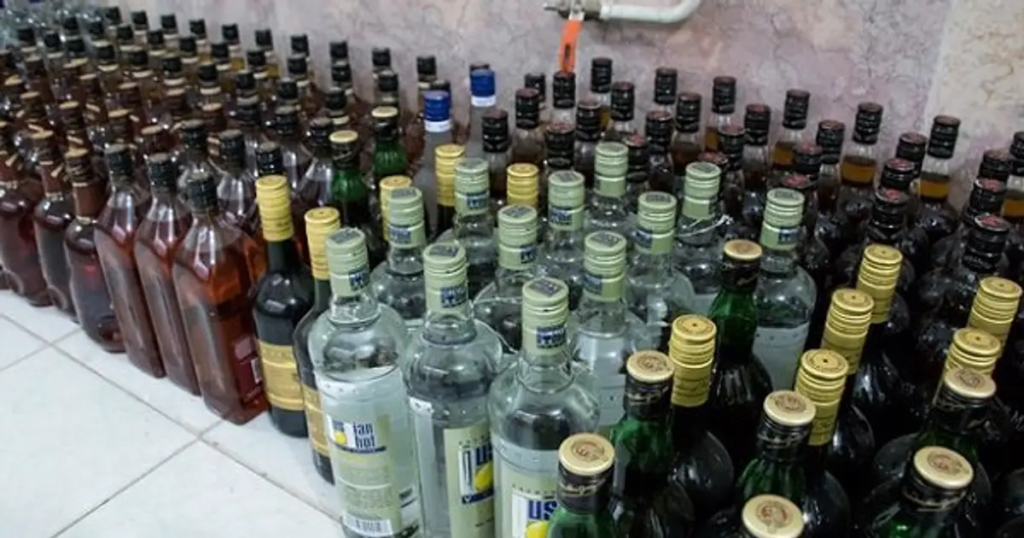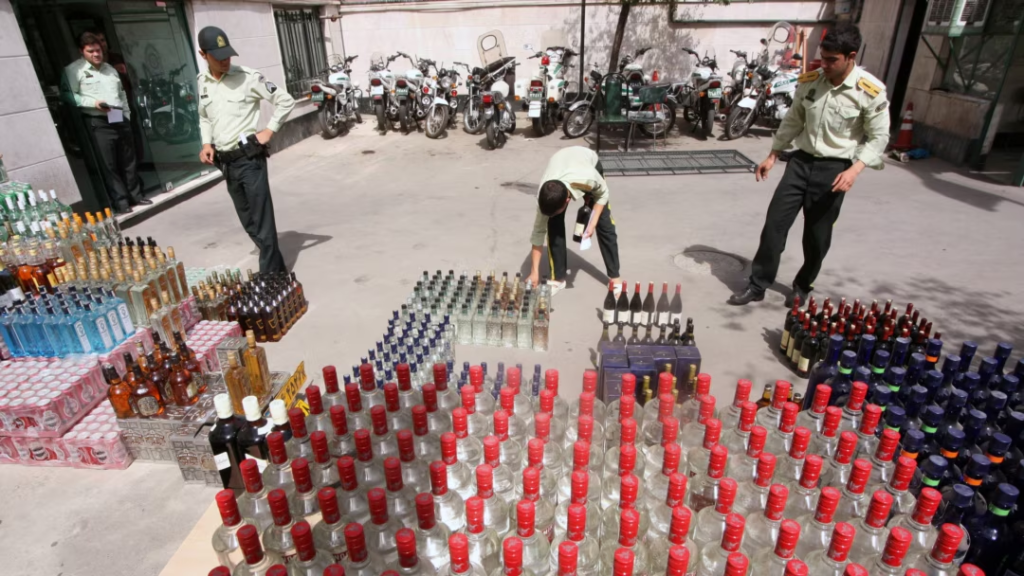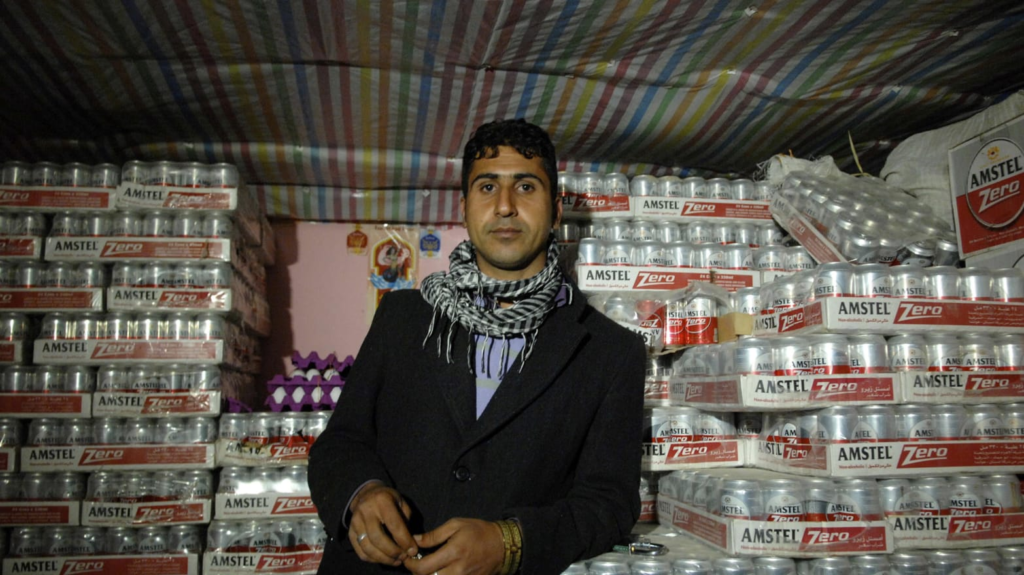Iran has once again faced a tragedy involving the consumption of tainted alcohol, highlighting a persistent public health issue in the country. In the past few days, at least 26 people have lost their lives due to drinking alcoholic beverages that contained toxic methanol.
This incident has sparked concern across the nation as the fatalities have occurred in various cities and towns across Iran, particularly in the northern provinces of Mazandaran and Gilan and the western province of Hamadan.
The severity of this situation not only lies in the tragic loss of life but also in the hundreds of hospitalizations resulting from alcohol poisoning.
The Danger of Methanol Poisoning in Iran
The Country has had a complicated relationship with alcohol since the 1979 Islamic Revolution, which led to the strict prohibition of alcohol across the country. Despite this, the demand for alcohol has not disappeared, resulting in a thriving black market for both imported and locally produced alcoholic beverages.
Read : Kill List Released by Iran: PM Benjamin Netanyahu on Top
Many Iranians resort to buying alcohol from bootleggers, and some even produce their own alcohol at home for personal consumption. Unfortunately, these unregulated sources often carry the risk of contamination, particularly with methanol. Methanol, a type of industrial alcohol, is extremely toxic when consumed and can contaminate improperly fermented or homemade alcohol.
Read : Satellite Photos Show Iran Expanding Missile Production: Assessed by American Researchers
The latest incident has left many wondering how such tragedies continue to unfold in The Country despite the awareness of the dangers of consuming bootlegged alcohol.
The specific source of the tainted alcohol in this case remains unclear, but previous incidents have shown that methanol can be introduced during the illegal production process.

Methanol is often mistaken for ethanol (the type of alcohol safe for consumption) because both are colorless liquids, but methanol can have deadly effects on the human body.
Alcohol Consumption in Iran and Its Risks
Although alcohol consumption has been banned in The Country since the Islamic Revolution, many Iranians still find ways to drink. Iran’s strict laws and harsh penalties, including fines, lashings, and even imprisonment, have not been able to completely eliminate the demand for alcohol.
In fact, the prohibition has likely contributed to the dangers associated with alcohol consumption in the country. Without regulated, legal options available, those who wish to drink alcohol must resort to obtaining it through illegal means.
The black market for alcohol in Iran is highly secretive, and the quality of the beverages sold is often questionable. Some bootleggers lack the proper equipment or knowledge to produce safe alcohol, and this can lead to contamination with methanol.
Others may even intentionally add methanol to increase the quantity of alcohol being sold, hoping to profit without regard for the potential health risks to consumers.
In recent years, alcohol poisoning has become a growing problem in The Country. In 2020 alone, more than 700 people died as a result of consuming toxic alcohol, and that number has only continued to rise.
While methanol poisoning is the most common cause of alcohol-related deaths in Iran, other contaminants can also be present in bootlegged beverages, adding to the danger.
The situation is exacerbated by the fact that many Iranians are unaware of the signs of methanol poisoning and may not seek medical help in time to prevent serious harm.
What Happens in the Body When You Drink Tainted Alcohol
When a person consumes tainted alcohol that contains methanol, their body breaks down the methanol into formaldehyde and formic acid, both of which are highly toxic.

The effects of methanol poisoning can be delayed, meaning that someone may drink alcohol and feel fine at first, only to experience severe symptoms hours or even days later.
The symptoms of methanol poisoning can vary depending on the amount of methanol consumed but may include headache, dizziness, nausea, vomiting, abdominal pain, and visual disturbances.
As the poisoning progresses, more serious symptoms such as blindness, seizures, and even coma can occur. In the worst cases, methanol poisoning can lead to death, as seen in the recent tragedy in Iran.
One of the most dangerous aspects of methanol poisoning is its impact on the eyes. Methanol is known to cause optic nerve damage, which can lead to partial or complete blindness.
This effect is so common in cases of methanol poisoning that many doctors associate sudden blindness with the consumption of tainted alcohol.
If caught early enough, methanol poisoning can sometimes be treated with an antidote that blocks the conversion of methanol into its toxic byproducts, but this treatment is not always available or effective.
The Alcohol Market and Public Health in Iran
Iran’s alcohol market, while officially nonexistent, is a complex and dangerous web of illicit activity. Imported alcoholic beverages, often smuggled in from neighboring countries, are sold alongside locally produced bootlegged alcohol.
Both types of alcohol can be contaminated with methanol or other harmful substances, making it nearly impossible for consumers to know whether what they are drinking is safe.
Iran also has dozens of alcohol factories, but these are primarily focused on producing alcohol for industrial, pharmaceutical, and cleaning purposes.

The alcohol produced in these factories is not intended for human consumption, but it sometimes finds its way into the black market as a cheaper alternative to imported alcoholic beverages. This further increases the risk of methanol poisoning, as industrial alcohol is far more dangerous than alcohol meant for drinking.
Despite the clear risks, many Iranians continue to drink alcohol in secret. The social and cultural pressures around drinking in Iran, combined with the legal consequences of being caught, make it difficult for those who experience alcohol poisoning to seek medical help.
In many cases, people wait too long before going to the hospital, fearing punishment or judgment. This delay in seeking treatment often leads to more severe symptoms and, in some cases, death.
The government has taken steps to crack down on the illegal alcohol trade, but these efforts have not been entirely successful. The black market for alcohol remains robust, and new sources of bootlegged beverages continue to emerge.
Until Iran addresses the root causes of the problem—such as the demand for alcohol and the dangers of prohibition—it is likely that alcohol poisonings will continue to occur.
Methanol Poisoning: A Growing Concern in Iran
The recent deaths in Iran are a stark reminder of the dangers of methanol poisoning and the ongoing public health crisis surrounding alcohol consumption in the country.
While Iran’s strict alcohol laws are intended to protect public morality and health, they have inadvertently contributed to the rise in alcohol-related deaths by driving people to seek alcohol from unsafe, illegal sources.
The tragedy of methanol poisoning is not just limited to Iran. Around the world, methanol poisoning has claimed countless lives, particularly in countries where alcohol is either heavily regulated or banned altogether.

The global health community recognizes the need for better education about the risks of methanol poisoning, as well as the importance of providing safe and legal options for alcohol consumption.
For Iran, this latest incident is a call to action. The government must find new ways to address the growing problem of alcohol poisoning while balancing the cultural and religious values that underpin the country’s alcohol laws.
Whether this means stricter enforcement of existing regulations or exploring new approaches to harm reduction, it is clear that something must be done to prevent further loss of life.
The tragic deaths of 26 people in Iran from tainted alcohol have once again shone a spotlight on the dangers of methanol poisoning. Iran’s alcohol prohibition, while rooted in religious and cultural beliefs, has led to a thriving black market where unsafe alcoholic beverages are sold to unsuspecting consumers.
Without significant changes to how alcohol is regulated and consumed in Iran, the risk of methanol poisoning will continue to loom large over the country’s public health landscape.

